Starting a beehive as a complete beginner can feel both exciting and intimidating. I found that the most helpful resources were always real stories from people who had already taken the first step.
This post shares my practical experience: what I did, what worked, what I would change, and what surprised me along the way.
If you’re looking for a step-by-step instructional guide, you can read Your First Steps in Beekeeping: The Complete Beginner’s Guide.
But this article is my honest walk-through of how I started my beekeeping journey.
How Did I Get The Idea
My beekeeping started quite unexpectedly, almost spontaneously. Though I had previously had occasional thoughts that it would be great to have my own hive, I had not implemented this idea in any way until one day — when we changed a fence at the back of our garden. There was a cosy spot between our shed and fencing which looked irresistibly inviting to put a beehive.
Shortly after I mentioned this idea to my hairdresser during our usual chat. Saying something like “It’s meant to be” she pointed at a lady sitting nearby and waiting for her turn. The lady’s husband happened to be a beekeeper. He also turned out to be a very nice and dedicated person generously sharing his knowledge and time while helping me constantly through my first year of beekeeping. Graham, my big thank you!
Why I Decided to Keep Bees
I wanted real honey — the kind that hasn’t been overheated, filtered to death, or adulterated. I also had good knowledge about propolis, and I wanted to make my DIY products, just for myself. I also loved the idea of supporting pollinators and developing a hobby that connected me with nature.
But I also knew I had a lot to learn, as I had no idea about:
- bee behaviour
- hive life cycles
- seasonal tasks
- safety around bees
and many other things. When I committed to getting bees, I relied heavily on my mentor’s help. I had visited his bees, and he made a list of essential things I would need to get and do before the arrival of my bees. I started reading about honey bees and I joined the local beekeeping association.
Checking My Suitability and Safety
Bees Sting
I should have checked if I wasn’t allergic to stings, but I did not. Now I would definitely recommend checking your reaction to bee venom first.
Before starting beekeeping I had never been stung by a bee or a wasp. But other insects bites made me very itchy. Unwisely, I tested my reaction to a bee sting on the day my hive was already set in my garden. It was moderate (fortunately, as I had expected).
The testing was in the evening when I was adding some candy pollen to the hive. Again very unwisely, I did not wear my beekeeping suit, as I thought the bees would be already settling for the night.
However, there are always bees in a hive performing guard duties — and one of them apparently perceived me as a threat despite me bearing gifts, and in the noble spirit of protecting her colony, she stung me (fortunately for me) on the leg.
I knew that I would not react as badly as to experience anaphylactic shock, but I think it is better to find it out in advance. Would it be a permanent barrier to enjoy beekeeping? For some people — yes, for others — no: I have heard of beekeepers with severe allergic reaction to bee venom, but they still enjoy this hobby. They do take all the necessary precautions though.
Bees In My Back Garden — Pros and Cons
During my first year I kept my hive in the garden. It looked idyllic (initially) but it was not convenient.
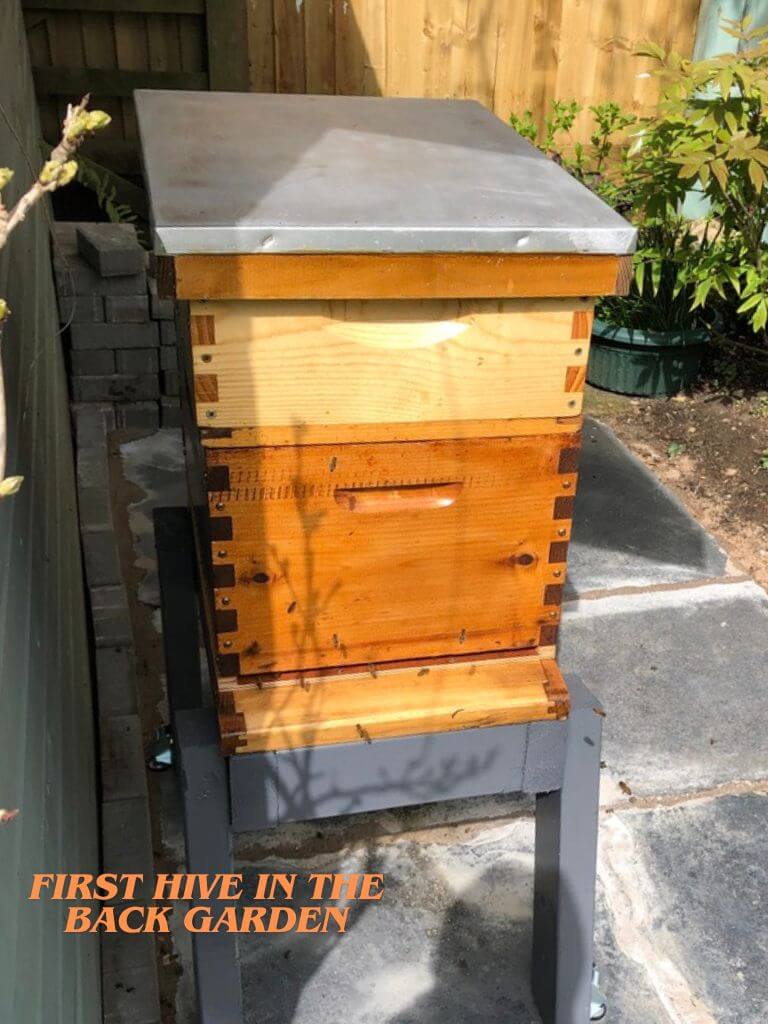
# I. Being a keen gardener I tend to my lawn and flower borders regularly, I enjoy the aesthetics of a nice looking, and in my case, traditional English style garden.
My bees also enjoyed quite a few plants in my garden but they were not keen on me mowing the lawn or weeding the border close to the hive.
So, that I had to do in twilight.
# II. I am also a dog owner, and I adore them. Dogs are very curious, and a hive is a definite draw. In retrospective I think that was the biggest thing to which I had not given necessary consideration.
I had been told that dogs would naturally keep away from bees. But they did not, at least not mine. The first thing one of my dogs did was to walk straight to the hive and put the face close to its entrance.
I was stunned for a split of a second, the bees also seemed to be stunned by such insolence. Then I scooped the dog away and removed them all from the garden.
Fortunately I had some garden netting with which I separated the hive. Even after that one of the dogs was chased once by a bee and was then apprehensive when entering the garden. Besides, the netting in front of the hive made it less aesthetically pleasing.
This taught me very quickly:
- keep pets away from the hive
- give bees enough personal space
# III. Another issue was that the bees’ main flight trajectory was over the lawn.
Unfortunately these lovely insects have a very short life span (that is considered to be one of the main reasons why bees cannot be domesticated).
Some died during their flight and fell on the lawn. So I was constantly picking up dead or nearly dead bees so that we did not step on them with their stings still quite active.
Having this experience, I think that I would not have a hive in my garden (unless it is a very big garden, and bees can be separated by tall shrubs where they will not be disturbed).
Being Close To My Bees — Definite Advantage
Despite all the issues in the back garden, the process of beekeeping turned out to be absolutely fascinating.
Just watching bees hurrying in and out of their hive is very therapeutic.
When bees start bringing nectar, the honey aroma even 2 meters away from the hive is divine. I set up my first hive in March, and at the end of May we were tasting the first honey — and it was the most fragrant, floral, fresh, delicious ever!
From practical point of view it was great to have the hive close. I could go there when I needed or wanted to, and all bits and bobs were conveniently in the shed next to it. That was when I became convinced that though I had to move the hive out of the garden, it would have to be somewhere close.
The following year I moved my hive into my neighbour’s field surrounded by a massive hedge with abundance of nectar and pollen rich shrubs, trees and flowers.
It was a walking distance for me, though I had to use a wheelbarrow pretty much all the time — beekeeping is quite a heavy lifting activity.
However, having bees in the field WAS idyllic: the bees could carry on with their business undisturbed, and we could once again enjoy relaxing in our garden.
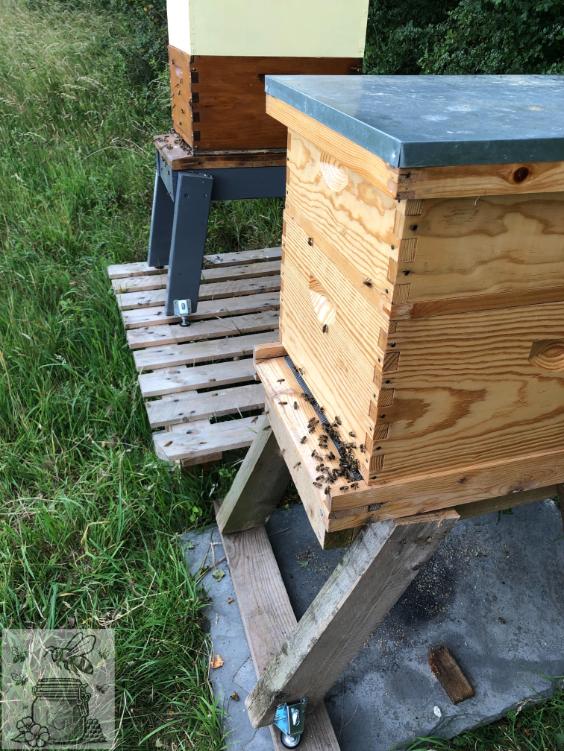
In fact, that is an ideal location as mentioned in Beekeeping for dummies by H. Blackiston (p. 49 Deciding Where to Locate Your Hives). Tested and confirmed by me as true:
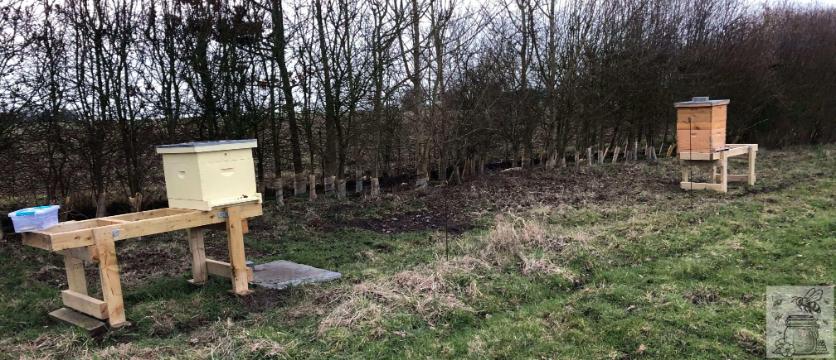
– my third year of beekeeping was a success:
four flourishing hives and so much honey that I had to sell some.
Then we moved the house, and I had to spend about 2 hours driving there and back just to get to my apiary. I quickly realised that it was not going to work.
Beekeeping is a very active and engaging activity, and for someone like me with work, family and house to look after having bees miles away is a massive challenge. Eventually I moved my bees to a new place — a nearby farm that was 5 minutes’ drive from my place. That was a relief and definite advantage.
Beekeeping Expenses
I would say that beekeeping is not cheap to start with, depending on what and where you buy it could be in the region of £600 (and it is easy to get carried away).
If you want to go deeper into the costs, my post How Much Does Beekeeping Really Cost? A Practical Beginner’s Breakdown may help.
However, once you keep it going, it is not that expensive. Besides, healthy flourishing hives are always in demand (if for whatever reasons one can no longer look after them).
And of course, bees produce delicious honey (and other good things) that one can always enjoy and even sell — not every hobby can pay for itself, but beekeeping certainly can. A jar of my honey has always been a welcome and popular gift to my friends and neighbours, and as a thank you.
How I Chose My First Hive
My choice was determined by my mentor, who had 3 Langstroth hives and who had begun feeling difficult to manage them all due to his old age. He offered me to purchase 1 of his hives which was excellent because at once I got a complete cedar hive set consisting of:
- a brood box,
- 2 supers,
- an open mesh floor with a varroa board and an entrance block,
- a crown board,
- a roof.
Plus, an overwintered bee colony.
Up to today I am still very happy with this type of beehive and would highly recommend it. There are 2 options: an 8-frame Langstroth hive and a 10-frame Langstroth hive. I have got and tried both but after a few years of beekeeping I prefer the first option.
My first hive was for 8 frames, and I had a strong and flourishing colony there. A 10-frame hive provides more space but it is noticeably heavier if you were to move it.
If you are still choosing your hive, my post How To Choose Your First Hive: A Guide to 4 Common Beehive Types may help.
With How Many Hives I Started
I personally started with 1 hive and a small colony of bees. And even with the help of my mentor it took me some time to begin managing the bees on my own with confidence. After all, they are unique living creatures, absolutely different from what I had ever experienced.
But I would recommend having two hives by the end of your first beekeeping year.
What Other Equipment and Tools I Bought To Start My First Beehive
I actually purchased the following:
- frames and foundation for the brood box x 2
- frames and foundation for 2 supers (plus, you will need nails, a small hammer and pliers)
- 1 extra hive set (to split my colony into 2 when time comes)
- a beekeeping suit
- 2 pairs of rubber gloves
- a kit including a smoker and 2 beehive tools (with a hook and a scraper)
- a blow torch with gas canister
- a spray bottle for water (which I now use as an alternative to a smoker)
- 2,5 kg candy pollen (to help my new colony to develop)
- a plastic container, a pack of soda crystals and a durable metallic sponge (to wash the tools)
Later in the first year I also purchased things for honey extraction and anti-varroa treatment. I also borrowed some equipment from my local beekeepers’ association.
My First Inspections — What Surprised Me Most
The first few inspections were quite clumsy because I felt unsure and a bit nervous, but also incredibly rewarding. I also worried constantly about accidentally hurting the queen. I checked:
- whether the queen was present
- brood pattern
- food stores
- bee temperament
- early signs of pests
I learned to inspect every 7–10 days in spring and summer — enough to monitor for issues without disturbing the bees too often.
Some things that surprised me:
- The colony grew faster than I expected.
- Bees are far calmer than I had imagined from watching videos.
- It’s harder than it looks to spot eggs or find the queen!
- Inspections are much smoother when you slow down and stay methodical.
Over time, my confidence grew, and I learned that bees are very forgiving of small beginner mistakes.
Harvesting Honey for the First Time
My first harvest was a milestone I’ll never forget.
I extracted capped honey using a simple extractor, filtered it, and jarred it.
The taste was incomparable to anything from a shop.
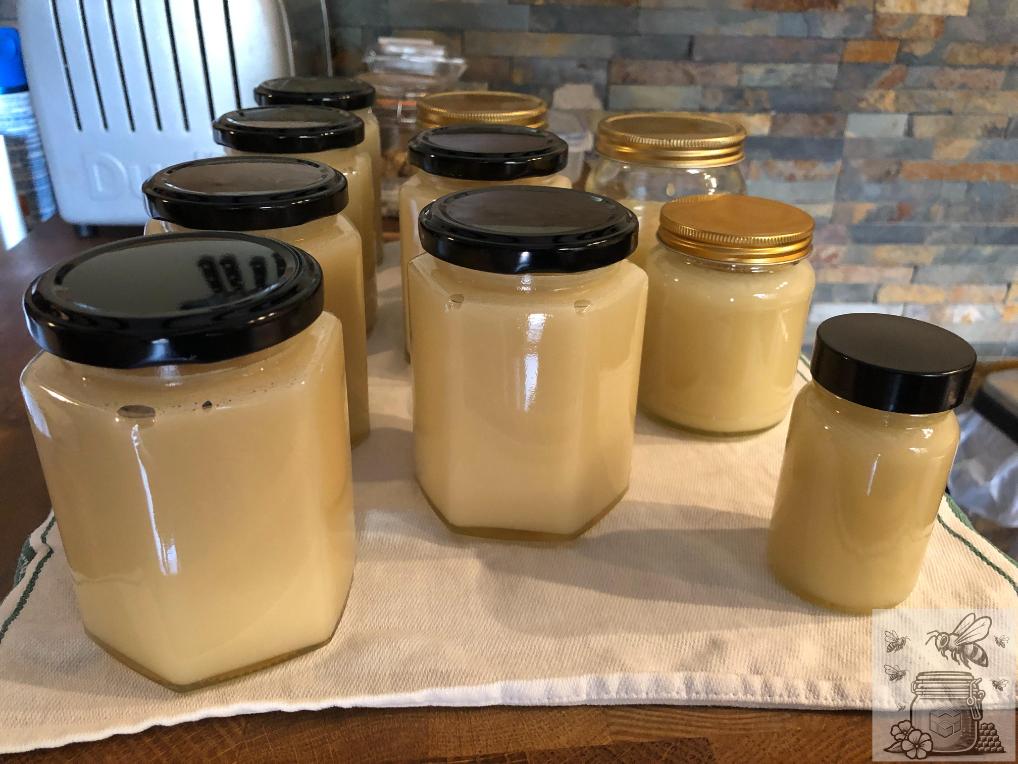
I also collected a small amount of propolis and beeswax, which eventually found their way into homemade DIY recipes.
What I Learned in My First Year — Honest Reflections
Here are the lessons that stayed with me:
- Bees know exactly what they’re doing — trust them more, worry less.
- Good equipment makes everything easier.
- Regular, gentle inspections build confidence faster than overthinking.
- Your first year is more about learning than honey.
- Having a mentor or active beekeeping group is incredibly helpful.
- Beekeeping is deeply rewarding — even when you make mistakes.
I also recommend using various resources:
- printed (books, magazines, brochures prepared by experiences beekeepers)
- online (BeeBase, BBKA, which would be helpful not just for UK beekeepers)
- local beekeepers’ association
- advice from fellow beekeepers
Final Thoughts
Starting beekeeping was very rewarding. It helped me to observe and learn a lot from the bees themselves. There were challenges, surprises, and mistakes — but each one made me a better beekeeper.
For structured, step-by-step guidance, you can return to my main beginner resource here:
👉 Your First Steps in Beekeeping: The Complete Beginner’s Guide
Feel free to explore the rest of the beginner category — it’s designed to support you through your first year and beyond.
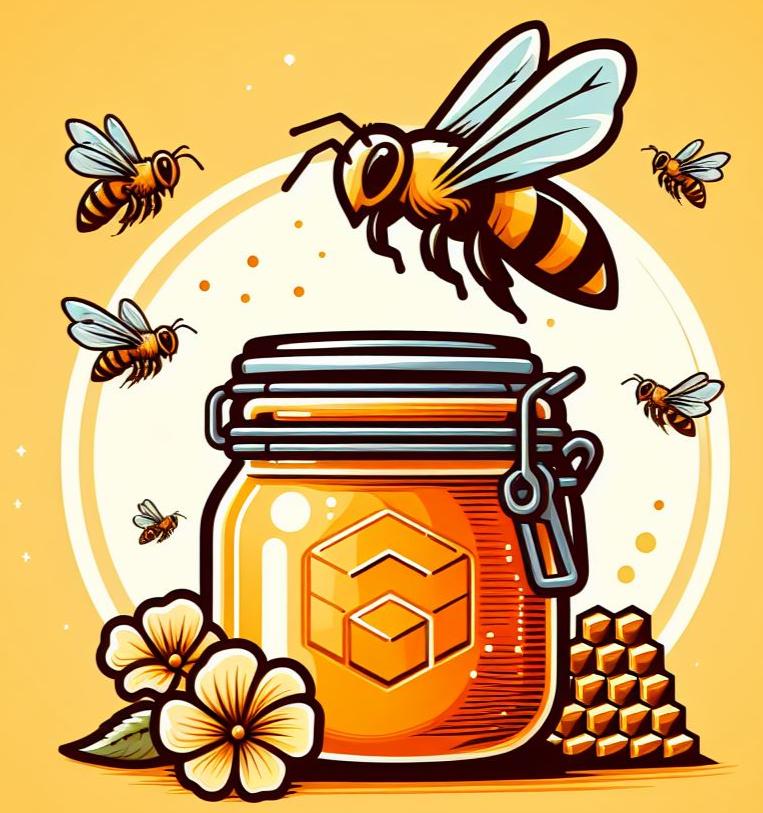
Your beekeeping journey offers practical advice for beginners, from a casual chat to unexpected connections and lessons. Insights on allergy testing, hive placement, and dealing with curious dogs provide valuable considerations. The move from your garden to a neighbor’s field adds a realistic touch to the joys and challenges of beekeeping.
Thoughts on expenses and the long-term affordability of beekeeping offer a practical perspective, showcasing the sweet rewards of this hobby. Emphasizing hygiene, time commitment, and the value of local beekeepers’ associations adds a thoughtful touch. In conclusion, your blog is an inspiring guide for beginners, capturing the essence of the beekeeping journey. May your bees thrive, and your enthusiasm inspires others in this buzzing community!
Thank you so much for such a detailed and positive review, I really appreciate it. We learn from what we do, from our successes and failures, but often other people’s observations and results make life just a bit easier. Even as a hobby beekeeping has its challenges, and I hope to help and overcome them as smoothly as possible.